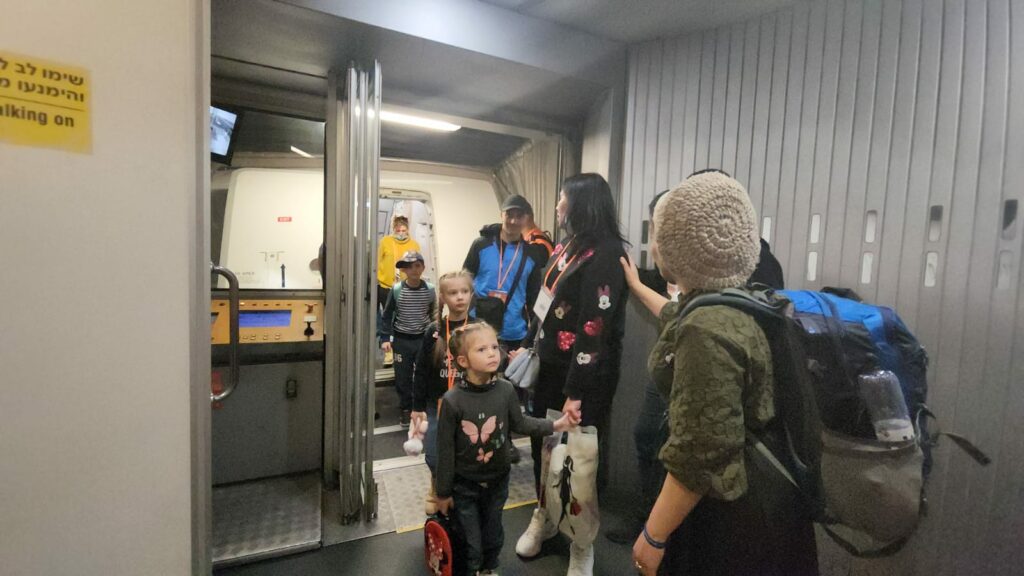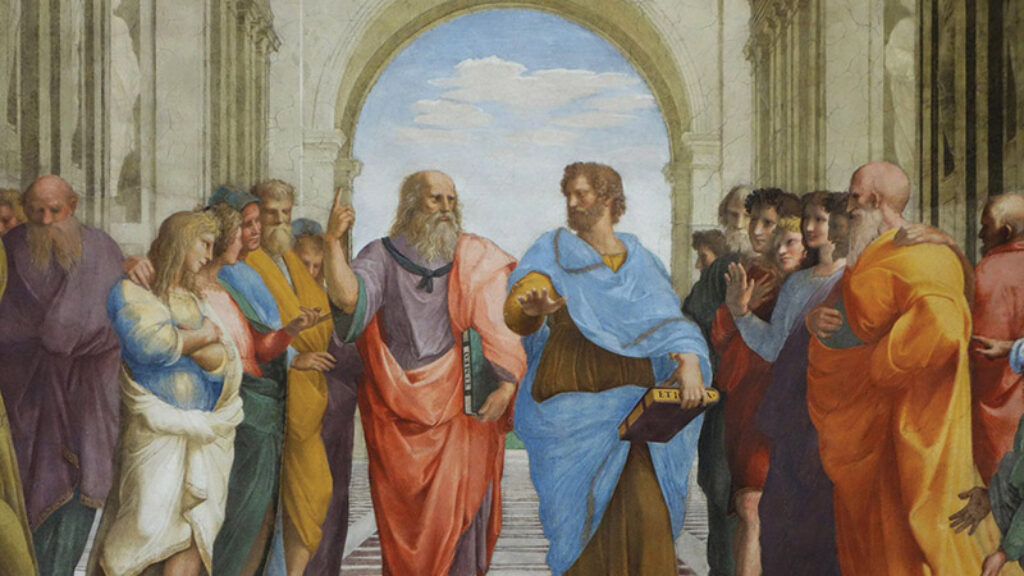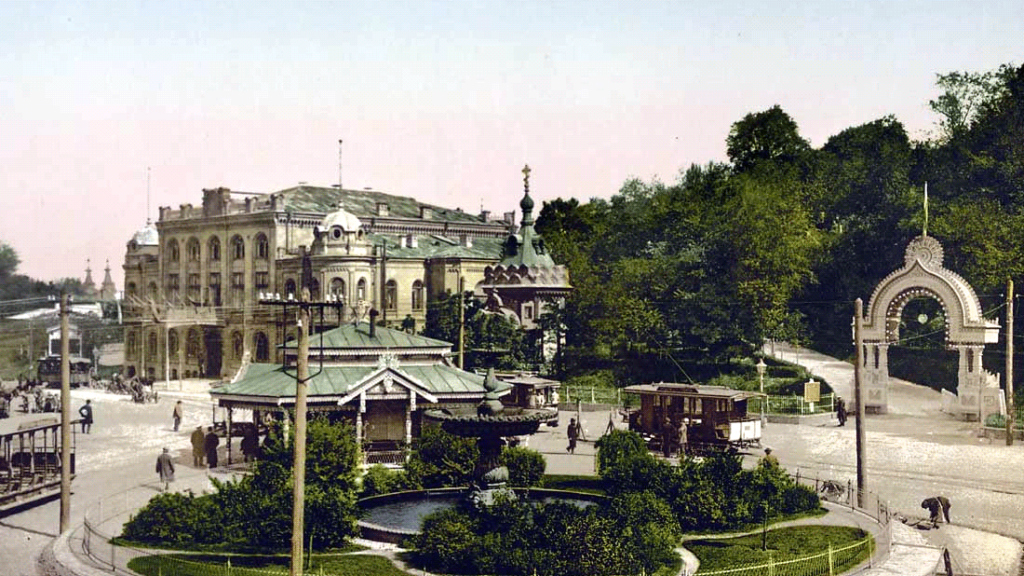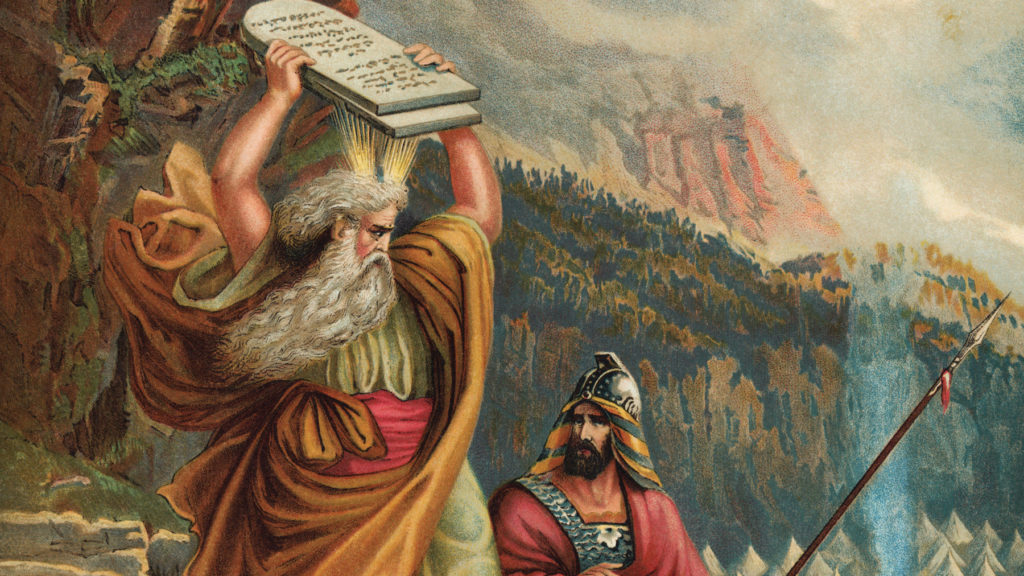Exodus from Kishinev
The twenty-seater van to the Chișinău International Airport lacks AC on the last day of the year that won’t be absolutely sweltering. Its seat coverings look like they’ve been grafted from the floors of the suburban New Jersey Marriotts where my high school debate conventions shared space with big fat Greek weddings. Our convoy of Ukrainian refugees and Hatzalah volunteers from Israel passes a lake about five hundred meters around in the middle of a wheat field, the first lovely water I’ve seen in Moldova. With the exception of the northern border with Ukraine, the geography of Moldova hadn’t really caught my attention since I joined the Jewish community’s relief efforts for Ukrainian refugees in Chișinău, which Jews still call Kishinev, in March. A few days ago, I asked my supervisor if I could shirk kitchen administration for a day and go to the beach. She suggested that I get on a bus—to Crimea.
Viktor across the aisle cleaned carpets in Mykolaiv until the Russian invasion pushed him and his wife, daughter, and mother south. We speak in Hebrew, which he learned during some boyhood years in Haifa. I ask about the city he’s just fled. He shows me pictures of apartments and government buildings that have been chomped into by Russian missiles. A video shows smoke rising from a residential area after a rocket strike. “It’s all shit now. It’s very hard,” he says. Where will he go in Israel? Viktor shakes his head.
Every time I see one of the refugees carrying their things in a plastic grocery bag, a dirty suitcase with foamy insulation poking out, or an overnight bag half the right size, I want to swap it for my seventy-liter camping pack or my duffle on wheels. Of course, that would only relocate what little property these folks have. Viktor’s little girl’s backpack gets me worst. It’s indigo and has a cartoon canine smiling under the caption “Crazy Dog.” I wish there were a locally made, reasonably priced third option between hand-me-down Americana and post-Soviet drab.
Na’ama wants to pass out water to the refugees at the airport check-in line and asks me where the plastic cups are. I curse the guy who’s been running the kitchen for the last few weeks for forgetting something so basic and punish him by smoking what I promise will be the last cigarette (okay, the last Winston) of my life. I borrow a lighter from a Hatzalah medic and apologize for yelling when his group brought alien bread into the Irish pub we kashered for the staff and refugees.
Unlike the cool kids in the United States, Ukrainians tend to get their nicotine outdoors, socially, and through traditional means. But the older parts of the world have their own innovations. The techie set insert shortened cigarettes filled with pressed tobacco into heating devices that beep when they’re ready for inhaling. I was introduced to these gadgets by a comrade who relocated from Odesa––her city didn’t need more volunteers––to Moldova to help those fleeing southward. For a few weeks, she’s looked after the food and medical care for fifty to seventy of her Jewish fellow citizens. I don’t think she has another home, so she’ll probably stay in Kishinev until her nation repels the Russian invasion. I hope to join her for coffee next year in the hometown she shares with Ze’ev Jabotinsky.

One of the officers at airport security empties my backpack and shrugs at the pricey cancer meds I’m bringing from Moldova to Israel to ship to somewhere near Moscow (long story––like, Russian long). What offends this officer of the law is my camping utensil, an all-in-one fork and spoon and dull, serrated blade. The constable answers my protest by gesturing at the picture of the Swiss Army knife on the wall and won’t listen to my argument that a Swiss Army knife is just what my utensil thingy is not. Miffed to lose the most useful item in my kit, I walk through the duty-free shop, which cleverly doubles as the corridor between security and the gates. The Moldovans are evidently proud of their wine (third largest export in 2020), none of which is kosher, but who among us is not at least tempted to buy something that comes in a glass bottle shaped like a warthog?
Someone’s found plastic cups. I’m charged with one of the two-liter water bottles and give the last of it to a young girl on a mission for a thirsty friend. She’s studied Hebrew well enough in her Ukrainian school to get out the syntactically pristine, heavily accented sentences ubiquitous among the Israelis from Russian-speaking lands I’ve met. Her meek confidence and streaks of blonde hair remind me of my sister.
After the water is gone, I notice some piously dressed fellows buying things at the duty-free shop. They’re Ukrainian Hasidim who’ve made it their business to smuggle military-age Jewish men out of the country. I ask one how he can possibly do such a thing. He assures me that there are ways. No, morally speaking, I say. He asks what the problem would be. Uhhh, you mean other than violating the laws of a just society fighting a just war?
“So a Jew should die for the sanctification of Ukraine?” he ripostes.
“Does it sanctify God’s name to abandon the country of which you are a citizen while it’s battling for its life?” I ask.
A second Hasid tells us to suspend our philosophical dialogue so we can say afternoon prayers. It’s after sundown in my book, but for the sake of peace, I make an idle member of the minyan.
I’m sure there’s more to do, because there’s always more to do, but I’ve probably spent four hours in as many weeks reading a book, so I buy a bottle of the best porter I’ve ever had and reopen Daniel Deronda. Gwendolen is a stunning young woman who wants to be adored but not loved. I suspect this Grandcourt chap may win her over on account of all of her pausing to ratiocinate when they meet at a dance after some archery. I’m finding Gwen’s hard-to-get shtick kind of torpid when her creator throws me this rope:
Could there be a slenderer, more insignificant thread in human history than this consciousness of a girl, busy with her small inferences of the way in which she could make her life pleasant?––in a time, too, when ideas were with fresh vigor making armies of themselves . . . when women on the other side of the world would not mourn for the husbands and sons who died bravely in a common cause . . . a time when the soul of man was waking to pulses which had for centuries been beating in him unfelt, until their full sum made a new life of terror or of joy.
I expect everyone has thought some sentence in a book was written directly to him or to her. Never in my own life has that experience produced the thought that the author wanted me to shut her book and turn to higher or to more urgent things. Praying that my own inferences are at least sometimes larger than small, I wave to the girl who got the last drink from the water bottle and board the bus that will take us across the tarmac to the plane.
We land in Tel Aviv five minutes after a hundred soon-to-be new Israelis start waving plastic flags of Zion. Greeting each passenger off the plane is my old pal David, the logistics chief for Hatzalah whose low-grade anxiety actually calms me down. At baggage claim, I give a bag of Israel’s best snack, chocolate-filled Bamba, to my water bottle friend and wish her and her mother a good Passover and good luck in their new life. A Ukrainian woman who looks more Israeli than most Israelis thanks me in bad English and assures me that she knows where she’s going.
Thank God that Moses and Joshua did too.
Suggested Reading

Objective Muddles and Persuasive Testimony
It may seem as though a religious tradition like Judaism would have no home in a philosophical ecosystem that cultivates nothing but a specific mode of intellectual engagement. But it is precisely the lack of a positive dogma that makes analytic philosophy compatible with the basic tenets of Judaism—at least that’s the premise of Jewish Philosophy in an Analytic Age.

The Old Country, Twice Removed
My grandfather had a way of mentioning the Kiev guberniya (province) that made it sound to me, when I was a boy, like it was our place in the Old Country—and more than half a century later, it still does.

Law in the Desert
Studying the weekly portion with Jerome, Nachmanides, and others, the seemingly tedious parts of Exodus become compelling.
Moses, Aaron, and Pharaoh Walk into a Bar: Passover in the Union Army
Yankee ingenuity at Passover: how one regiment made a Seder in the midst of the Civil War.
Comments
You must log in to comment Log In